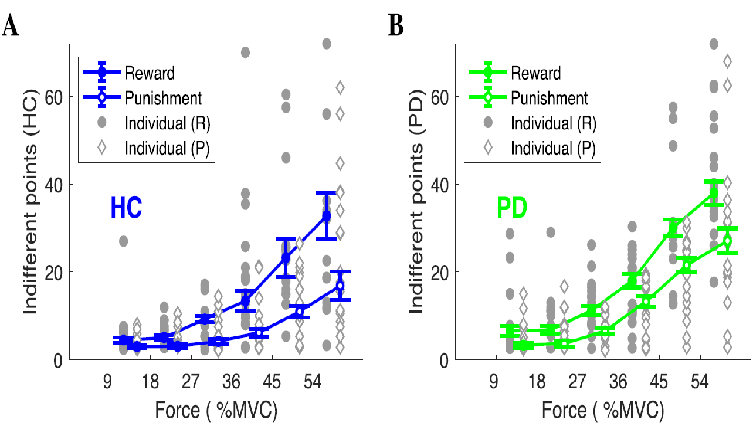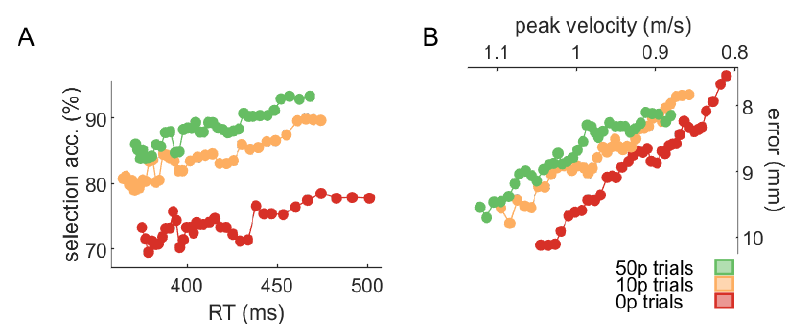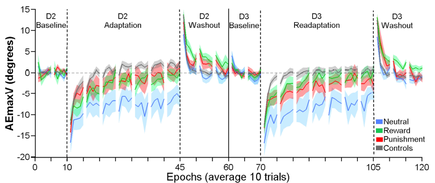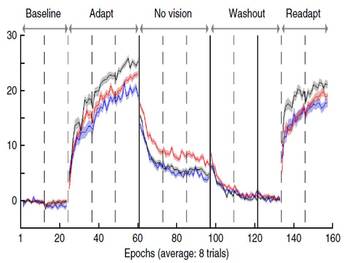A little bit about myself...
I completed my PhD on bimanual coordination in the School of Psychology, University of Birmingham with Prof. Chris Miall. I subsequently worked at Johns Hopkins University as a research fellow where I investigated the neural correlates of motor learning with Dr Pablo Celnik. I then moved to University College London as a senior research fellow with Prof. John Rothwell and became interested in the role of dopamine in motor learning. In 2012, I took up an independent research fellow post at the University of Birmingham (funded by the ‘Birmingham Fellows’ scheme), became a Senior Lecturer in 2016 and a Reader in 2020.
Current Lab Research
We are broadly interested in motor control and learning. We use behavioural, non-invasive stimulation, brain imaging, genetics and pharmacology techniques to better understand how our brain controls and learns movements in health and disease. At present, we are investigating (i) how reward-based feedback influences our actions and can be used to alter the speed at which our motor system learns or retains new movements (ii) the process in which people 'fuse' sequential reaching movements (i.e. cursive handwriting) and the the neural process which underlies it (does holistic control exist?) (iii) the role of glucose in motor consolidation/retention.
Loss Aversion During Effort-Based Decision-Making
|
Chen, Voet, Jenkinson & Galea. 2020. Dopamine-dependent loss aversion during effort-based decision-making. Journal of Neuroscience
Loss aversion — preferring to avoid punishment than to acquire equivalent reward — is an important concept in decision-making under risk. However, little is known about whether loss aversion also exists during decisions where the cost is physical effort. This is surprising given that motor cost shapes human behaviour, and a reduced willingness to exert effort is a characteristic of many clinical disorders. Here, we show that healthy human individuals exert more effort to minimise punishment than to maximise reward (loss aversion). We also demonstrate that medicated Parkinson's disease patients exert similar effort to gain reward but less effort to avoid punishment when compared with healthy age-matched controls. This indicates that dopamine-dependent loss aversion is crucial for explaining effort-based decision-making. |
Reward and Motor Performance
|
Codol, Holland, Manohar & Galea. 2020. Reward-based improvements in motor control are driven by multiple error-reducing mechanisms. Journal of Neuroscience
While reward is well-known for enhancing motor performance, how the nervous system generates these improvements is unclear. Despite recent work indicating that reward leads to enhanced feedback control, an untested possibility is that it also increases arm stiffness. We demonstrate that reward simultaneously improves the selection and execution components of a reaching movement. Furthermore, we show that punishment has a similar positive impact on performance. Importantly, by combining computational and biomechanical approaches, we show that reward leads to both improved feedback correction and an increase in stiffness. Therefore, reward drives multiple error-reduction mechanisms which enable individuals to invigorate performance without compromising accuracy. This work suggests that stiffness control plays a vital, and underappreciated, role in the reward-based improvements in motor control. |
Reward, Punishment and Motor Learning in Stroke
|
Quattrocchi, Greenwood, Rothwell, Galea* & Bestmann*. 2017. Reward and Punishment enhance motor adaptation in stroke. JNNP *equal contribution.
The effects of motor learning in stroke rehabilitation are often transient, thus mandating approaches that enhance the amount of learning and retention. Previously, we showed in young individuals that reward and punishment feedback have dissociable effects on motor adaptation, with punishment improving adaptation and reward enhancing retention. If these findings were able to generalise to patients with stroke, they would provide a way to optimise motor learning in these patients. Therefore, we tested this in 45 patients with chronic stroke allocated in three groups. Patients performed reaching movements with their paretic arm with a robotic manipulandum. After training (day 1), day 2 involved adaptation to a novel force field. During the adaptation phase, patients received performance-based feedback according to the group they were allocated: reward, punishment or no feedback (neutral). On day 3, patients readapted to the force field but all groups now received neutral feedback. All patients adapted, with reward and punishment groups displaying greater adaptation and readaptation than the neutral group, irrespective of demographic, cognitive or functional differences. Remarkably, the reward and punishment groups adapted to similar degree as healthy controls. Finally, the reward group showed greater retention. This study provides evidence that reward and punishment can enhance motor adaptation in patients with stroke. |
Reward, Punishment and Motor Learning
|
Galea , Mallia , Rothwell & Diedrichsen. 2015.The dissociable effects of punishment and reward on motor learning. Nature Neuroscience
A common assumption regarding error-based motor learning (motor adaptation) in humans is that its underlying mechanism is automatic and insensitive to reward- or punishment-based feedback. Contrary to this hypothesis, we show in a double dissociation that the two have independent effects on the learning and retention components of motor adaptation. Negative feedback, whether graded or binary, accelerated learning. While it was not necessary for the negative feedback to be coupled to monetary loss, it had to be clearly related to the actual performance on the preceding movement. Positive feedback did not speed up learning, but it increased retention of the motor memory when performance feedback was withdrawn. These findings reinforce the view that independent mechanisms underpin learning and retention in motor adaptation, reject the assumption that motor adaptation is independent of motivational feedback, and raise new questions regarding the neural basis of negative and positive motivational feedback in motor learning. |
Current Collaborators
Chris Miall
Ned Jenkinson
Obi Robotics
Katja Kornysheva (Bangor)
Anna Sadnicka (St Georges)
Sven Bestmann (UCL)
Nick Ward (UCL)
Jean-Jacques Orban de Xivry (Leuven)
Ned Jenkinson
Obi Robotics
Katja Kornysheva (Bangor)
Anna Sadnicka (St Georges)
Sven Bestmann (UCL)
Nick Ward (UCL)
Jean-Jacques Orban de Xivry (Leuven)




